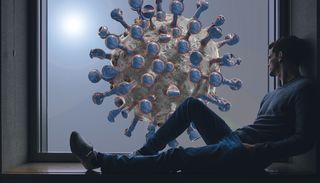Loneliness
Using Nostalgia to Cope With COVID
Nostalgia can help us cope with troubled times like these.
Posted April 11, 2020

Rifling through the meager contents of my freezer this morning in search of something that might pass for breakfast, I happened upon a box of toaster strudels—apple. I have no idea where they came from (a recent visit from my daughter, perhaps), but grateful for the chance to put off going out into the contagious world for another day, I grabbed the box without hesitation and popped two of them into the toaster.
Three minutes later, as I leaned against the counter with a cup of coffee in one hand and a strudel in the other, I took a bite of the pastry and was suddenly overwhelmed by an intense feeling of pleasure. As tasty as the strudel was, the pleasure had nothing whatsoever to do with the flakiness of the crust or the sweetness of the filling and icing. The pleasure I felt was not sensory at all, but rather emotional, for biting into the strudel instantly transported me backward 20 years to my mother-in-law’s kitchen in Virginia. In those days, before our children’s summers filled up with the organized activities that go along with growing up, our family used to make long lazy summer visits to my wife’s mother’s house in Newport News. Since the children woke up and came downstairs at different times in the morning, their grandmother always kept toaster strudels on hand so that a quick breakfast could be prepared as the demand arose. During a given summer visit, I probably ate two or three boxes of the things all by myself—so many, in fact, that I completely lost my taste for them and never ate another one. Until this morning, that is. That single bite of strudel sent a surge of pure, undiluted nostalgia coursing throughout my body, and I savored the feeling until long after the empty plate had disappeared into the dishwasher.
My nostalgic response to a taste that I had not experienced in over 20 years was not, in and of itself, particularly surprising. The power of taste and smell as nostalgic triggers has been abundantly documented. What was surprising was the intensity of the feeling, and the fact that a mouthful of sugar and starch could make me feel so good at a time when, objectively speaking, there is so little to feel good about. Psychological research on nostalgia, however, suggests that my sudden trip down memory lane in the midst of a life-threatening, world-changing pandemic is neither unusual nor unexpected. Nostalgia is, in fact, a common response to distress, and actually serves an adaptive function that can help us emotionally weather tumultuous circumstances such as the one we’re all living through now.
Studies designed to identify the circumstances under which we are most likely to feel nostalgic indicate that experiencing distress, or “negative mood” is a very common trigger of nostalgia. Distressing experiences identified in the research as inducing negative mood, and triggering nostalgia, include loneliness, boredom, and “self-discontinuity,” all of which are now daily norms as we hunker down in our homes to keep from being infected or infecting others, and watch 24-hour news coverage of the havoc that the pandemic is wreaking in the world outside our front door.
We experience loneliness because we’re physically isolated from the dozens of friends, family members, co-workers, and complete strangers with whom we normally rub elbows, shake hands, and share personal space every minute of the day. We experience boredom because a large portion of the activities with which we usually fill our time—including work for many of us—are no longer available, leaving us with vast spans of unoccupied time on our hands. We experience self-discontinuity, a “sense of disruption or disjointedness between one’s past and present self,” in response to the undeniable rupture the pandemic has torn in the mottled but generally coherent fabric of “life as we know it.” Related to this sense of self-discontinuity is the confrontation with our own mortality that such widespread illness inevitably forces, triggering an understandable and wholly rational fear of death, the ultimate self-discontinuity.
Faced with emotional stressors such as these, it is not uncommon for us to find our minds drifting back to some pleasant memory from our past, such as my family’s summer trips to Virginia. And rather than merely allowing us to momentarily escape from a stressful present, to which we have no choice but to eventually return, these nostalgic journeys actually help us to cope with the present to which we are inescapably bound.
Nostalgia combats loneliness by giving us access to pleasurable experiences we have shared with other people in our past. Researchers have found that nostalgia is “a deeply social emotion,” with a majority of our nostalgic memories revolving “around the self in social context.” During most nostalgic memories, our mind is “peopled” with friends, family, and assorted other acquaintances from our past, so no matter how alone we may be in the present moment, we needn’t be lonely as long we can tap into our “peopled” nostalgic memories.
While nostalgia might not be able to prevent us from being bored, in the way it keeps us from being lonely, it can help us cope with some of the unpleasant emotional effects that go along with boredom. Research indicates that “boredom fosters purposelessness,” which in turn threatens our general perception of the meaningfulness of our lives. Nostalgic memories help to combat this “meaning threat” by allowing us to “revisit meaningful past experiences” which serve “to shore up perceptions of meaning in the present.”
When our self-continuity, or the “sense of connection between one’s past self and present self,” is disrupted by such singular watershed moments as the pandemic we’re all currently enduring, nostalgia can counter that disruption by promoting “feelings of continuity.” Remembering in the present pleasurable and meaningful experiences from the past “helps people feel connected to their pasts and as if part of who they are remains stable across time.”
Finally, when hourly reports of global, national, and local death tolls from the pandemic confront us with the mortal threat that surrounds us on every side, nostalgia can help us cope with the mortality awareness triggered by this confrontation. While recalling pleasant memories of our past cannot make us any less aware of the inevitability of death, the sense of meaning with which these memories invest our lives can help us to be “insulated from the cognitive, emotional, and attitudinal effects of heightened death-awareness.” In other words, “nostalgia prevents death thoughts from becoming death fears.”
So in the days, weeks, and months of distancing and danger that lie ahead of us, if a random happy memory pops into your head out of nowhere, don’t dismiss it as a trivial distraction from the pressing matters of the present. Hang on to the memory and savor it for all it’s worth. Not only will it provide you a welcome temporary escape into an undeniably simpler past; it will, more importantly, help you to cope with the very complex and troubling present in which we are living.
References
Routledge, Clay. Nostalgia: a Psychological Resource. Routledge, Taylor & Francis Group, 2016.
Wildschut, T., Sedikides, C., Arndt, J., & Routledge, C. (2006). Nostalgia: Content, Triggers, Functions. Journal of Personality & Social Psychology, 91(5), 975–993. https://doi-org.proxy103.nclive.org/10.1037/0022-3514.91.5.975
Wildschut, T., Sedikides, C., & Routledge, C. (2008). Nostalgia — From cowbells to the meaning of life. Psychologist, 21(1), 20–23.




